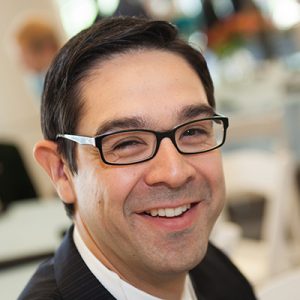August 23, 2023

Professor Shawn Hingtgen, Ph.D. will further his research on pediatric brain cancer patients with funding from the Ian’s Friends Foundation for his joint effort with project lead Scott Floyd, M.D., Ph.D., of Duke University around living tissue brain slices.
“Ian’s Friends is an amazing foundation that is changing the lives of children with brain cancer. We are so grateful for all their incredible support over the years,” said Hingtgen. “This new award will allow us to explore exciting new aspects of the living tissue brain slice platform. Working in partnership with Dr. Scott Floyd and his team at Duke University, this work sets the stage to begin translating this technology into human patients.”
As a professor in the division of Pharmacoengineering and Molecular Pharmaceutics at the UNC Eshelman School of Pharmacy, Hingtgen’s lab seeks to harness the potential of stem cells to develop new and better methods for treating terminal cancers, including brain, breast and lung.
According to Hingtgen, this project is focused on understanding the evolution of the surrounding non-tumor cells in response to the presence of tumor tissue, in part using new technology that gives information on each individual cell describing the genomic content and where it lies in 3D space.
According to the proposal, many current commonly used models of human cancer lack the relevant microenvironment of real human tumors, resulting in faulty information about how real patient tumors behave, and contributing to the failure of many experimental cancer therapies. Although these failed therapies are unfortunate for all types of cancer, this is especially unacceptable for pediatric brain tumors where the lack of effective therapies is severe.
The project’s new technology, the Organotypic Brain Slice Culture (OBSC) platform, was developed in close collaboration with Carolina Research Assistant Professor Andrew Satterlee, Ph.D., and allows real human tumors to grow rapidly in a native microenvironment context enabling functional screening and testing in a time frame that is clinically actionable. Using the OBSC platform will lead to profiling treatment-resistant tumor cells to determine mechanisms of drug resistance and design effective therapies.
This innovative project will leverage the strengths of two high-impact laboratories at Carolina and Duke. If successful, this critical initial project will enable direct testing of therapeutic approaches and treatment resistance profiling for living patient tumors and will rapidly advance novel therapeutic strategies for pediatric brain cancer.
“The potential to truly make a difference in the lives of pediatric brain cancer patients has always been our focus, moving closer to achieving this goal is incredibly exciting and rewarding,” said Hingtgen.
Latest News

Ph.D. student aims to make global impact through vaccine research



